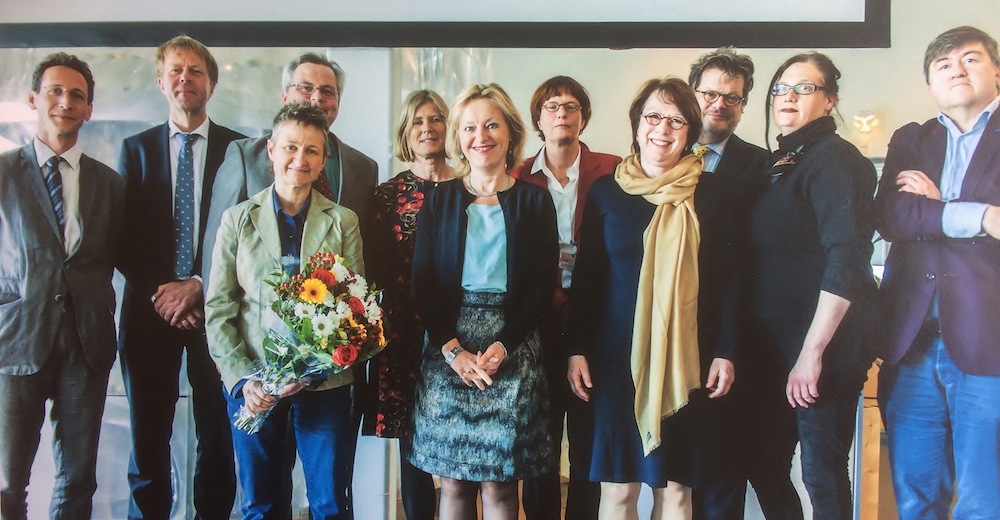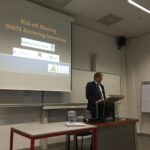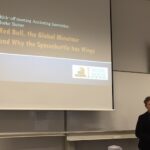 The CHS team is excited to share news of the Gravitation Grant of 18.8 million euros recently awarded by the Dutch Research Council (NWO) to OIKOS, the National Research School in Classical Studies in the Netherlands to develop its research agenda (“Anchoring Innovation”) over a period of ten years (2018-2027).
The CHS team is excited to share news of the Gravitation Grant of 18.8 million euros recently awarded by the Dutch Research Council (NWO) to OIKOS, the National Research School in Classical Studies in the Netherlands to develop its research agenda (“Anchoring Innovation”) over a period of ten years (2018-2027).
We recently had the opportunity to connect with Ineke Sluiter (Leiden University), who will be directing this program together with André Lardinois (Radboud University). Professor Sluiter shares more about the Gravitation Grant.
CHS: What was your reaction when you first heard the news of receiving the Gravitation Grant?
It was a combination of pure exhilaration and an oppressive sense of the responsibilities imposed on us. This is a grant for a ten-year period, of a type that is normally awarded to the sciences, medicine, and technology. We will be the first group of Humanities scholars to take on this challenge, and it means that our success or failure may have repercussions for the way people regard the Humanities as an academic enterprise. Naturally, we are keen to make a success of it. The feelings of joy and exhilaration were fortunately reinforced rather drastically in the days after the announcement by the very supportive and happy reactions that we received. So right now we are definitely in ‘yes, we can!’ modus.
CHS: What makes Anchoring Innovation stand out from other efforts to break down barriers between the humanities and sciences?
In all we have said and written about it, a central idea is that of ‘consilience’: the notion that, fundamentally, science and scholarship cannot be at odds with itself. If different branches of scholarship looking at the same object come up with fundamentally different ideas, that in itself produces research questions. Innovation is an issue relevant to many disciplines.
Innovation is central to our current societies, and a lot of new inventions are produced by our colleagues in the sciences. It struck us that our society has a general tendency to delegate innovation to the sciences, medicine and technology, and that there is a missed opportunity there. As classicists, we are in the unique position that we study societies in their entirety, in all aspects. So for us it is easy to see that innovation plays a role in all societal domains. Not just in technology, but also in politics, the arts, religion, philosophy, and the law, to mention just a couple. As historians we can also (at least sometimes) see beginning, middle and end of a phenomenon. And finally, we are in a great position to study the human factor in all of this. How do people react to ‘the new’. How do they manage to adapt to it and to integrate it into their lives.
We want to expand the idea of innovation to all societal domains and to look at that human factor, but we also want to talk to our colleagues in different disciplines and see whether we can mutually be helpful. That’s consilience.
CHS: Where do humanities fit in towards our deeper understanding of innovation?
Well, if we take the broad view of innovation, and we are serious about the inclusion of ‘the human factor’, we should realize that we can invent anything we want, but unless the relevant social groups find this new thing acceptable, understandable, desirable, compatible with their values, no actual innovation will come about. One way to look at innovation is as ‘anchored invention’.
CHS: What is the groundbreaking new concept of anchoring?
In our field we have always thought about issues such as ‘tradition and originality’. The basic idea of ‘anchoring’ is very simple: it refers to all the ways in which people connect what they regard as new to what they see as already familiar. The connection between the new and the familiar is not just a juxtaposition: we suspect that ‘anchoring’ itself actually helps to accept the ‘newness’.
The other advantage to this concept is that it allows people from different disciplinary backgrounds to engage in meaningful dialogue. Think about it: literary scholars may be working with concepts of intertextuality – in fact, if you look at it a certain way, that’s a form of anchoring. Cultural historians are engaged in memory studies: the ways in which groups create or confirm their identity by referring to a shared vision of the past. That can be regarded as a form of anchoring. ‘Anchoring’ in no way obliterates the differences between those approaches. We should keep using them. But historians and literary scholars may find some common ground for discussion in the concept of ‘anchoring’. And the same is true, as we have experienced, when we talk to economists (who are interested in how new products find their way into the market), or cognitive scientists or social psychologists (who are interested in the cognitive and psychological mechanisms in coping with the new).
 CHS: What kind of steps have you taken along with André Lardinois and the fellow classicists of your team in developing this project?
CHS: What kind of steps have you taken along with André Lardinois and the fellow classicists of your team in developing this project?
As often, the idea for this program came from contemporary issues. We just started to pay attention to all the societal discussions about innovation, the fact that no one seemed to think the Humanities had anything to contribute, and the technocratic nature of the discussion: where were the people, the social factor? We started reading around (rather widely) and came up with the idea of ‘anchoring’. Many classicists immediately see that that concept is relevant to their work.
Four Dutch Universities thought this idea was so promising that they gave us some seed money to prove that the Humanities could handle a big multiyear project like this and to provide proof of concept. So we set up a pilot project, with some smaller projects, to test how it would go. And we also tried to get in touch with scholars from other disciplines to see whether this would interest them and whether we could mutually inspire each other. That was surprisingly easy! We organized a number of expert meetings, and no one we invited ever turned us down. So we really did speak to economists, people in business administration, sociologists (working on ‘belonging’), social psychologists (working on ‘creativity’) and people studying the ‘social construction of technology’, a fascinating field. But in the meantime we were doing serious Classics research on the commentary tradition (a form of anchoring, after all), issues of Romanization and globalization, the construction of the network of Roman roads in Northern Europe, and the use of Latin in fascist Italy. Our national research school in Classics, OIKOS, was vital in all of this, because our graduate students are just used to talking to each other across the subdisciplines of Classics.
The other thing we did was to find out whether there was any interest in our ideas in the rest of society (this of course is the infamous issue of ‘knowledge utilization’ – but with this topic it came quite naturally). So the director of the Ministry of Economic Affairs came to our conference, and we reciprocated by giving a paper to the specialists on ‘knowledge and innovation’ in his Ministry.
We’ve actually been working on this for quite a while now: we started in 2012, and this year we got the big grant to keep going with it.

CHS: What do your immediate next steps involve, and what is your vision for Anchoring Innovation in the long run?
Because we’re already in full throttle with that pilot program, we’re hitting the ground running. We now have money for more postdocs and graduate students (this is actually how those are funded in the Netherlands, almost always through the grant-getting initiatives of their Professors; a graduate student is not technically a ‘student’ in the Netherlands, but rather a junior researcher with a paid job). We’ll make sure to advertise widely and also to let the Classics community know about conferences, workshops and other activities.
In the long run, what I would hope is that the concept of Anchoring finds wider use, and that it may even become a normal term to use in newspapers and other media, just like the term ‘framing’. People tend to forget that ‘framing’ was also a scholarly concept that someone came up with and which was the cornerstone of a whole body of scholarly work. Now it’s almost a household term. That’s what we hope will happen to ‘anchoring’. Anyone interested in learning more is invited to take a look at our website https://www.ru.nl/oikos/anchoring-innovation/anchoring-innovation/, or just to get in touch with André Lardinois or myself (a.lardinois@let.ru.nl; i.sluiter@hum.leidenuniv.nl). We’re really grateful that the CHS is giving us this opportunity to share some of our ideas.




